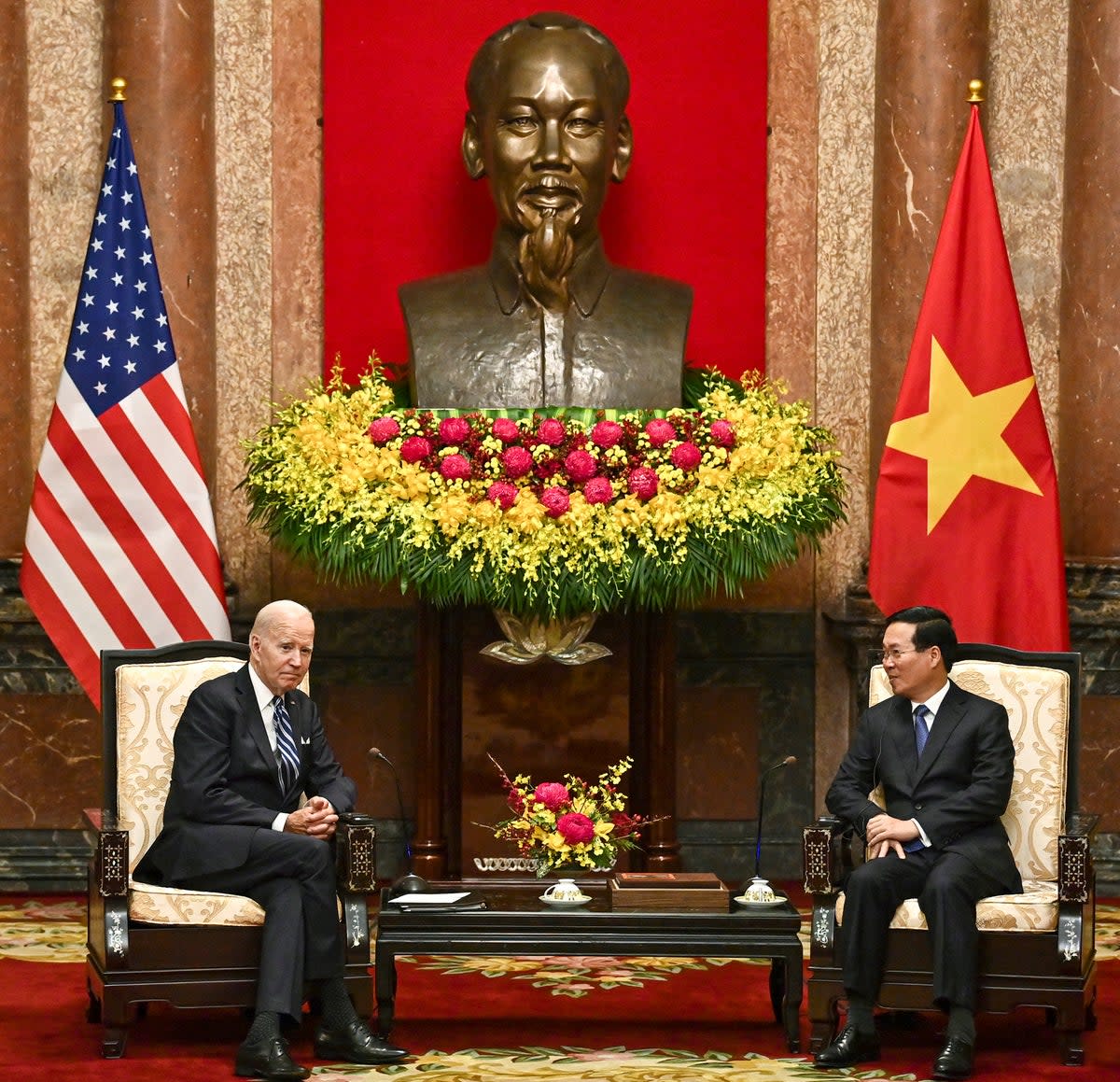Joe Biden’s rambling speech cut off by White House staff
A “rambling” press conference by Joe Biden in Vietnam was abruptly cut short by the White House staff, leaving many in the audience puzzled.
It came at the end of a historic visit in which the US president highlighted new business deals and partnerships between the former enemies, including a $7.5bn aircraft deal between Vietnam Airlines and Boeing.
“We talked about stability, we talked about making sure the third world... excuse me... the southern hemisphere has access to change. It wasn’t confrontational at all,” the 80-year-old president said as he began to trail off.
His press secretary Karine Jean-Pierre cut in decisively: “Thank you, everybody. This ends the press conference. Thanks, everyone.” Mr Biden made his exit from the stage, but not before his microphone was abruptly muted and the speakers started to play jazz music while he continued to address reporters unaware that he was inaudible.
“I’m going to go to bed,” the president said.
The bizarre turn of events did not go unnoticed. “Joe Biden’s staff cut his mic in the middle of a sentence during a press conference, who is really in charge?” asked Benny Johnson of The New York Times.
Joe Biden’s staff cut his mic in the middle of a sentence during a press conference
Who is really in charge?
pic.twitter.com/me1yIxKxkL— Benny Johnson (@bennyjohnson) September 10, 2023
“Joe Biden’s staff cuts off a rambling Joe Biden mid-sentence and abruptly ends his news conference. I have never seen this occur with any other president,” wrote Andrew, a senior political analyst from Don’t Walk, Run! Productions.
WATCH: Joe Biden's staff cuts off a rambling Joe Biden mid-sentence and abruptly ends his news conference.
I have never seen this occur with any other president. pic.twitter.com/LqvW2VsESH— Andrew @ Don’t Walk, RUN! (@DontWalkRUN) September 10, 2023
Earlier, Mr Biden denied there was an ongoing “cold war” between the US and China.
“I just want to make sure that we have a relationship with China that is on the up and up, squared away, everybody knows what it’s all about,” Mr Biden said after landing in Hanoi as part of his landmark visit.
He told reporters that there was no “cold war” between Washington and Beijing, adding: “It's about generating economic growth and stability.”
“I want to see China succeed economically, but I want to see them succeed by the rules,” Mr Biden added.
It came days after the Chinese foreign ministry called on the US to “abandon the cold-war mentality and zero-sum game mindset” in its view of Asia.
However, during the G20 summit in India, Chinese premier Li Qiang reportedly met Mr Biden on the sidelines and urged the American leader to see the possibilities that his nation offers.
Mr Li, who kept a low profile at the summit, “stressed that China’s development is an opportunity for the US, not a challenge,” according to Chinese foreign ministry spokesperson Mao Ning.
Mr Biden said the two discussed “stability” and that it “wasn't confrontational at all”.

But the G20 is over and Mr Biden’s visit to Vietnam is likely to irk China, which is a key partner of Hanoi.
Mr Biden is the first American president to visit Communist Vietnam since the end of the war in the 1970s to elevate bilateral relationship amid China’s rising aggression in the Indo-Pacific region.
“Vietnam and the United States are critical partners at what I would argue is a very critical time,” Mr Biden said, as Washington looks to tap into the Vietnamese workforce as an alternative to Chinese factories.
At a fundraiser in Salt Lake City, Mr Biden said that Vietnam doesn’t want a defence alliance with the US, instead they were looking for “relationships because they want China to know that they’re not alone”.
Vietnam has been one of the few Southeast Asian countries to push back against China’s absolute claims on the South China Sea. To counter Beijing, Vietnam is looking westward to forge stronger bilateral trade ties.
The US president spoke extensively about strengthening Vietnam's semiconductor industry a executives of top American and Vietnamese firms met on Monday.
“My message today is quite simple. Let’s keep it up,” Mr Biden told the chief executives. “We need to develop and drive our collaboration, We need to forge new partnerships.”
Semiconductors have been at the heart of the US-China trade war with Washington reducing Chinese access to advanced chipmaking and other technology they say might be used in weapons.
During Mr Biden's visit, Vietnam Airlines signed a $7.5bn deal with US-based Boeing to buy about 50 aircraft and Arizona-based Amkor Technology's has planned to invest $1.6bn for a factory in Bac Ninh Province.
The White House said that the administration would help “build Vietnamese capacity to fight regional and international transnational crime”, including targeting illegal, unreported and unregulated fishing. China has been locked in long-running territorial conflicts with Vietnam, along with the Philippines, Malaysia and Brunei, as Beijing claims waters in the other nations’ exclusive economic zone.
Mr Biden finished his trip by paying respects at a memorial honouring his late friend and colleague Senator John McCain, who endured a lengthy imprisonment in Hanoi during the Vietnam War after his Skyhawk dive bomber was shot down by the North Vietnamese in 1967.
